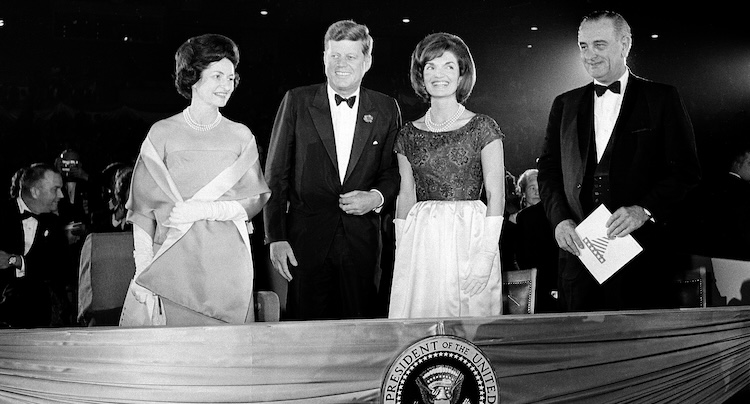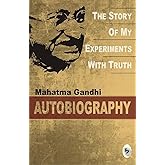Access your Commentary account.
Lost your password? Please enter your email address. You will receive a link to create a new password via email.
- December 2024
The monthly magazine of opinion.

The Life of Mahatma Gandhi, by Louis Fischer
Men like Gandhi do not happen very often—no oftener perhaps than men like Buddha, Jesus, and Mohammed. Unhappily, the lives of such great spiritual leaders are too often shrouded in the aura of sanctity created by their followers, and the clouds of piety are already closing around Gandhi. Now that he is dead, his life and teachings are rapidly taking on the irrelevance of a saint’s.
To this tendency Louis Fischer’s straightforward biography is a welcome and necessary antidote. The author deliberately limits himself to the record of Gandhi’s life, with a minimum of analysis and interpretation. The book follows Gandhi through his childhood in a little state in western India, his marriage at the age of thirteen, his training for the bar in England, his residence in South Africa where his “experiments with truth” began in earnest, the first civil disobedience movement in South Africa, his return to India, and his emergence as the greatest leader of India and one of the truly universal men of history.
Some of this record has been available before, notably in Gandhi’s autobiography and in his book on South Africa. But they cover only the early period of his life and are not intended as a full record. In Fischer’s book, the Western reader can see Gandhi’s development as a whole for the first time. This is important, because a key to the understanding of Gandhi is to know that he was a man with an extraordinary capacity for growth. While his central approach and the outlines of his techniques were developed early in his public career, they were constantly modified and enriched by experience and self-examination. Gandhi had all the flexibility possible to a man who is sure of his first principles. He was not afraid to admit that he had been wrong. In fact, he often changed his mind in public. His opponents found this quality disconcerting and many of his friends found it bewildering. But when seen as a process and understood in context, his development has a compelling internal consistency.
_____________
Fischer’s book rights some misplaced emphases and corrects some misapprehensions about Gandhi. Many Westerners think of Gandhi solely as the leader of India’s independence movement, but much of his work had little direct (albeit enormous indirect) application to the achievement of independence. He fought untouchability. He labored mightily for Hindu-Moslem unity. He advocated spinning and cottage industries. To him, independence was not an end but one of the means by which India could contribute to the world. He had no use for an independent India without spiritual content. On August 14, 1947, India’s first day of freedom, Gandhi was conspicuously absent from the public ceremonies. He was deeply troubled, for independence had brought with it the partition of India and terrible Hindu-Moslem riots. Much of his life’s work seemed to lie in ashes. Yet ahead of these days of tragedy lay his pilgrimage of reconciliation to the blood-soaked riot areas and his fasting for communal harmony.
Gandhi’s fasts, too, have been widely misunderstood in the West. They are often thought of as a kind of political blackmail, whereas they were first of all a method of self-purification, an essential part of his spiritual growth. But they were more than this. Gandhi’s fasts made a continent stop and consider: they provided a kind of cooling-off period. During the fasts, people were not simply worried about what would happen to the Mahatma. They worried also about what had happened to them and they searched their consciences. A new set of forces was released and from this creative process flowed political consequences.
Gandhi was a man of God, but he was not a mystic. He neither saw visions nor heard voices. To him, God was “an eternal principle.” One of Gandhi’s approaches to God was through prayer, which he called “the key of the morning and the bolt of the evening.” Another was through active, creative love for his fellow men. To the question, “Am I my brother’s keeper?” Gandhi answered an unequivocal yes. But he went much further. He was his brother. He said, “I am a Moslem, a Hindu, a Buddhist, a Christian, a Jew, a Parsi.” Gandhi had an almost overwhelming sense of identification, not only with “the people” but with persons. When there were Hindu-Moslem riots, Gandhi went to live in Moslem homes in the riot areas. In his fight against untouchability, he adopted an untouchable as his daughter.
Gandhi’s varied activities were directed at the outward and inner condition of men. Nonviolence to him was not just a convenient political technique, as it was to many of his followers. It was an act of love, and if the act were separated from the motive, or the motive distorted, the technique was useless and dead.
One of the most troubling aspects of Gandhi’s life was his relations with his family, with which Fischer deals frankly. When a man considers all humanity as his family (Indians call Gandhi Bapu —“Father”) what becomes of the people who actually happen to be his wife and children? Gandhi’s wife Kasturbai must have been for years the most miserable woman in India. She was constantly in the position of having to carry out orders and adapt herself to situations that were completely outrageous to her most fundamental prejudices. Though an illiterate woman, she was certainly not a simple one, and she remains a somewhat enigmatic figure. In Fischer’s book, she comes most clearly to life in a pathetic letter to her son Harilal, who was an alcoholic. Gandhi’s sons, too, suffered from alternate suffocating supervision and what seems to have been almost indifference. Gandhi did not allow himself many reticences, but he seems to have been less frank than usual about his family.
Fischer has not said the last word on Gandhi; in a sense, he has said only the first. Gandhi’s life raises many questions which need further exploration.
Among these questions are: What were the psychological factors which helped to produce Gandhi? Does his technique of non-violence have a more universal validity? Can it be recreated for use in the Western world? What can we learn from Gandhi’s unique experience in seeking equality for religious and racial minorities? (He had the extraordinary experience of being the leader of an oppressed minority in South Africa and an often oppressive majority vis-à-vis the untouchables and Moslems in India.)
In America, serious study of Gandhi has been limited almost exclusively to two groups: the clergy and the friends of India. He is considered their proper oyster. Intellectuals, when they interest themselves in India at all, usually by-pass Gandhi in favor of Nehru. Nehru is a man of great charm and unquestioned intelligence, but he is essentially derivative. Gandhi was an original. His basic ideas were, in a sense, as hackneyed as Shakespeare’s plots. They had been the common property of mankind for thousands of years. But he was able to take them, and through the totality of his life, re-create them with all their elemental freshness and force.
Just as it would be unthinkable for a serious and intelligent person in our time to fail to formulate an attitude towards Stalin or Stalinism, it should be unthinkable to fail to have an attitude towards Gandhi and Gandhism. Louis Fischer’s book is the place to begin.

Power Brokers

A Reputation Reclaimed

The 1960s Were Not-So-Goodwin
Scroll Down For the Next Article
Type and press enter
- More Networks

The Life of Mahatma Gandhi
Louis Fischer | 4.36 | 2,780 ratings and reviews
Ranked #8 in Gandhi
Similar Books
If you like The Life of Mahatma Gandhi, check out these similar top-rated books:

Learn: What makes Shortform summaries the best in the world?

Recently Visited
Top Categories
Children's Books
Discover Diverse Voices
More Categories
All Categories
New & Trending
Deals & Rewards
Best Sellers
From Our Editors
Memberships
Communities
- Biographies & Memoirs
- Leaders & Notable People

Download the free Kindle app and start reading Kindle books instantly on your smartphone, tablet, or computer - no Kindle device required .
Read instantly on your browser with Kindle for Web.
Using your mobile phone camera - scan the code below and download the Kindle app.

Image Unavailable

- To view this video download Flash Player


Follow the author

The Life of Mahatma Gandhi Paperback – January 1, 1997
- Print length 672 pages
- Language English
- Publisher Harpercollins
- Publication date January 1, 1997
- Dimensions 4.45 x 1.85 x 7.05 inches
- ISBN-10 0006388876
- ISBN-13 978-0006388876
- See all details

Similar items that may deliver to you quickly

Product details
- Publisher : Harpercollins (January 1, 1997)
- Language : English
- Paperback : 672 pages
- ISBN-10 : 0006388876
- ISBN-13 : 978-0006388876
- Item Weight : 12.7 ounces
- Dimensions : 4.45 x 1.85 x 7.05 inches
- #8,513 in Political Leader Biographies
About the author
Louis fischer.
Discover more of the author’s books, see similar authors, read book recommendations and more.
Customer reviews
- 5 star 4 star 3 star 2 star 1 star 5 star 80% 14% 3% 1% 2% 80%
- 5 star 4 star 3 star 2 star 1 star 4 star 80% 14% 3% 1% 2% 14%
- 5 star 4 star 3 star 2 star 1 star 3 star 80% 14% 3% 1% 2% 3%
- 5 star 4 star 3 star 2 star 1 star 2 star 80% 14% 3% 1% 2% 1%
- 5 star 4 star 3 star 2 star 1 star 1 star 80% 14% 3% 1% 2% 2%
Customer Reviews, including Product Star Ratings help customers to learn more about the product and decide whether it is the right product for them.
To calculate the overall star rating and percentage breakdown by star, we don’t use a simple average. Instead, our system considers things like how recent a review is and if the reviewer bought the item on Amazon. It also analyzed reviews to verify trustworthiness.
- Sort by reviews type Top reviews Most recent Top reviews
Top reviews from the United States
There was a problem filtering reviews right now. please try again later..
Top reviews from other countries
- Amazon Newsletter
- About Amazon
- Accessibility
- Sustainability
- Press Center
- Investor Relations
- Amazon Devices
- Amazon Science
- Sell on Amazon
- Sell apps on Amazon
- Supply to Amazon
- Protect & Build Your Brand
- Become an Affiliate
- Become a Delivery Driver
- Start a Package Delivery Business
- Advertise Your Products
- Self-Publish with Us
- Become an Amazon Hub Partner
- › See More Ways to Make Money
- Amazon Visa
- Amazon Store Card
- Amazon Secured Card
- Amazon Business Card
- Shop with Points
- Credit Card Marketplace
- Reload Your Balance
- Amazon Currency Converter
- Your Account
- Your Orders
- Shipping Rates & Policies
- Amazon Prime
- Returns & Replacements
- Manage Your Content and Devices
- Recalls and Product Safety Alerts
- Registry & Gift List
- Conditions of Use
- Privacy Notice
- Consumer Health Data Privacy Disclosure
- Your Ads Privacy Choices

IMAGES
VIDEO